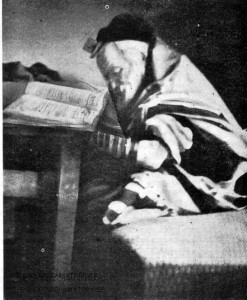Tag : jewish text
April 25, 2017 by Rachel Sandalow-Ash
In Defense of Lashon Hara

Rabbi Yisroel Meir Kagan
On my grandmother’s wall, a black-and-white photograph of an old, bearded man stares down at me. “Do you know who that is?” she asks.
“Yes, Grandma,” I sigh. She asks me this question every time I go to her apartment. “That’s our ancestor, the Chofetz Chaim.”
“A great tzadik,” a righteous man, she agrees. “He preached about the dangers of gossip, of lashon hara.”
In 1873, my great-great-great grandfather, Rabbi Yisroel Meir Kagan, wrote a book on the biblical laws prohibiting gossip and slander. The book was called Chofetz Chaim, “Seeker of Life,” and his followers started calling its author by the same name. When I first learned about the Chofetz Chaim, I thought his opposition to gossip made sense; after all, nobody likes to be talked about behind their back.
But growing up, I realized that in day-to-day life, people rarely characterize remarks made by men as gossip. And then I wondered, is gossip just a derogatory term for women’s speech? And are prohibitions against gossip just another way to silence women?
In the Chofetz Chaim’s Orthodox, Eastern European world, women did not study Talmud in Yeshiva; and they were excluded from political activity. So women talked about work, family, and the ins and outs of everyday life. In other words, when and where women could not talk about ideas, they talked about people: a topic of conversation that the rabbis termed gossip.
However, women didn’t and don’t just gossip when we lack access to highbrow intellectual conversations. We also engage in gossip in order to effectively combat injustice. We talk about people, rather than simply talking to them, because in a world of patriarchy and power imbalances, directly addressing those who harm us is often a futile or counterproductive strategy. Women, and all people in subaltern positions, gossip because we find strength in numbers.
- 2 Comments
 Please wait...
Please wait...